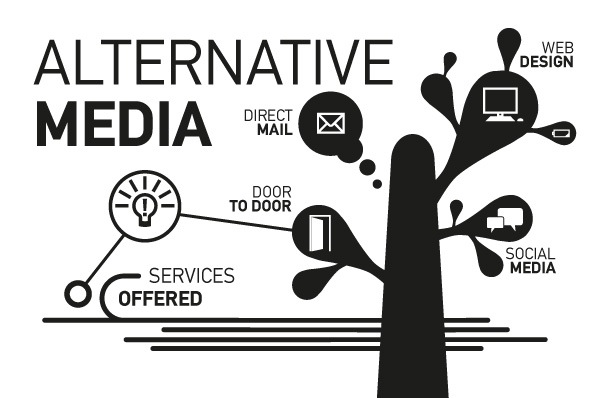Alternative Media
Alternative Media is defined as media sources that differ from established or dominant types of media in terms of their content, production, or distribution.
As long as the media has been around, so has alternative media. There has always been a more socially accepted view of things, and throughout history, there has always been a way people tried to combat the more socially accepted sources. Alternative media acts as a foil to the mainstream media by providing the individual person with a chance to not only read about less reported topics but to do the reporting themselves.
One clear-cut example of this is Johann Gutenberg’s printing press in 1436. This was considered alternative media because before the invention of the printing press, only the clergy had access to the bible, but the printing press made this information and the bible itself readily available to the common person.
Christian Fuchs wrote an article in the European Journal of Social Theory that stated alternative media must have four distinct parts. These parts were that the audience of the media must be involved in the creation of said media, the second is that it must differ from the mainstream, the third is that the perspective of the media must be different from those of the state and major corporations and lastly it must "Establish different types of relationships with the market and or the state."
Alternative Media is important because it challenges the established “normal” way of thinking. It does this by going against the status quo and presenting points of view and stories not typically found in the mainstream media to a larger audience. This may be through articles, but the beauty of alternative media is that it can take many forms, ranging from social media to music, radio to print, street art to performance, and anywhere in between.
Sites like South Front, Signs of the Times, The Corbett Report are prime examples of alternative media websites that are delivering messages repressed and disregarded by the media. For example, the about page of the Corbett Report describes the website as "An independent, listener-supported alternative news source. It operates on the principle of open-source intelligence and provides podcasts, interviews, articles, and videos about breaking news and important issues from 9/11 Truth and false flag terror to the Big Brother police state, eugenics, geopolitics, the central banking fraud and more." While some agree and some don't, Jame Corbett's, the host of the Corbett Report, views are not those that align with the mainstream media, so he has taken decided to inform those with the same views as him about these issues himself.
That is why alternative media is so important. Since it highlights voices that mainstream media does not broadcast as much, these individuals have the liberty to be very independent. They create less biased and politically influenced content and report on what is important to them in a way they see fit.
On the flip side, there are a few issues that make alternative media more of a challenge than mainstream media. One being these voices and sources are harder to find since because they aren't mainstream or endorsed by big businesses they tend to get buried under the more popular ones on search engines and such. Alternative media is also at times referred to as “less credible” than the mainstream media because it is less known about and less popular than the big well-known news sites. The two prior reasons are also why these alternative media sites tend to have smaller audiences than other media. However, these smaller audiences are incredibly loyal because the site they do follow is one of the few providing news and information on topics that are important to them.
Alternative media is geared for the younger generation. Millennials and Gen Z are more likely to search out these sources and create content that counters that of the larger media houses. This is for many reasons, one being that Gen Z and the Millennials seem to align themselves with the ideals that aren't necessarily congruent to those of the mainstream media. A glimpse at social media can show you more and more teens and young people are getting involved in politics and politically charged topics and standing up for what they believe in.
Alternative media impacts all of us because when approaching an issue it is important to be well informed on both sides before you make a judgment. I know myself as a journalist, alternative media impacts me greatly because until I am established in the journalism world I can publish my work independently through alternative channels. My friends use social media as a tool not only to share updates on their lives but to share their thoughts and opinions, as well as spread information around about important topics to them. Alternative media is woven way tighter into our society than many people realize, people just need to know where to look.
Resources
https://en.wikipedia.org/wiki/Alternative_media#cite_note-:7-8
Comments
Post a Comment